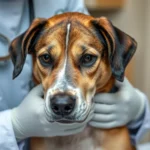
Understanding why Golden Retrievers get cancer is crucial for pet owners who want to ensure a long and healthy life for their beloved companions. Cancer is one of the most common health issues facing dogs, and unfortunately, Golden Retrievers are particularly vulnerable. Research indicates that about 60% of Golden Retrievers will develop some form of cancer in their lifetime, making it essential for owners to be informed about the risks, symptoms, and preventive measures.
Understanding Cancer in Dogs
What is Cancer?
Cancer is a group of diseases characterized by the uncontrolled growth and spread of abnormal cells in the body. Normally, cells grow, divide, and die in a regulated manner. However, cancer cells can evade this process, leading to the formation of tumors and potentially spreading to other parts of the body.
Types of Cancer Common in Dogs
Dogs can develop various types of cancer, including lymphoma, osteosarcoma, and hemangiosarcoma. While all breeds can be affected, certain breeds, like Golden Retrievers, have higher incidences of specific cancers. Understanding these types can help owners recognize early signs and seek prompt veterinary care.
Why Do Golden Retrievers Get Cancer?
Genetic Factors
Genetic predisposition plays a significant role in the development of cancer in Golden Retrievers. Research has identified several genes that may increase the likelihood of cancer in this breed. For instance, mutations in the TP53 gene, which is crucial for regulating cell division and preventing tumor formation, have been linked to higher cancer rates in Golden Retrievers.
Environmental Factors
The environment can significantly influence cancer risk. Exposure to various carcinogens—substances that can lead to cancer—may increase the likelihood of developing the disease. Common environmental factors include:
- Pesticides and Herbicides: Regular exposure to lawn chemicals has been suggested as a risk factor.
- Tobacco Smoke: Secondhand smoke from cigarettes can increase cancer risk.
- Diet and Nutrition: Poor nutrition and a diet high in processed foods may contribute to cancer risk.
Lifestyle factors, such as lack of exercise and obesity, can also play a role in the likelihood of developing cancer.
Age and Cancer Risk
Age is a significant factor in the risk of cancer. As dogs age, their cells accumulate mutations, increasing the chance of cancer development. The average lifespan of a Golden Retriever is about 10 to 12 years, which coincides with a higher incidence of cancer in older dogs. Regular veterinary check-ups are essential for early detection as a dog ages.
Common Types of Cancer in Golden Retrievers
Lymphoma
Lymphoma is one of the most common cancers in dogs, particularly in Golden Retrievers. It is a cancer of the lymphatic system and can manifest in various forms. Symptoms may include swollen lymph nodes, weight loss, and lethargy. Diagnosis often involves blood tests and biopsies. Treatment options typically include chemotherapy and, in some cases, radiation therapy.
Osteosarcoma
Osteosarcoma, a type of bone cancer, is notably prevalent in Golden Retrievers. This aggressive cancer often affects the long bones of the limbs. Symptoms can include swelling in the affected area, limping, and pain. Early diagnosis is crucial, typically achieved through X-rays and biopsies. Treatment usually involves surgical removal of the tumor, often followed by chemotherapy.
Hemangiosarcoma
Hemangiosarcoma is a malignant tumor of the blood vessels and is particularly aggressive. Golden Retrievers are at a higher risk for this type of cancer, which often affects the spleen and heart. Symptoms may be vague initially but can include sudden lethargy, pale gums, and abdominal swelling. Diagnosis often involves imaging techniques like ultrasound and blood tests. Treatment may include surgery and chemotherapy, but prognosis is often guarded.
Other Notable Cancers
Other cancers that can affect Golden Retrievers include mast cell tumors, melanoma, and prostate cancer. Regular veterinary check-ups can help in early detection, leading to better treatment outcomes.
Signs and Symptoms of Cancer in Golden Retrievers
Physical Symptoms
Pet owners should monitor their dogs for common physical signs of cancer, including:
- Lumps or bumps: New growths should always be evaluated by a veterinarian.
- Unexplained weight loss: Significant weight loss can indicate an underlying health issue.
- Changes in appetite: A sudden decrease or increase in appetite may be a warning sign.
- Persistent lethargy: Decreased energy levels or reluctance to engage in usual activities can be concerning.
When to See the Vet
It is essential to consult a veterinarian if any of the above symptoms are observed. Early detection of cancer can significantly improve the prognosis and treatment options available. Regular health monitoring and communication with your vet about any changes in behavior or health can help catch issues early.
Prevention and Care
Regular Veterinary Check-ups
Routine veterinary visits are crucial for the early detection of health issues, including cancer. During a check-up, veterinarians perform physical examinations and may recommend diagnostic tests to monitor health. It is advisable to establish a schedule based on your dog’s age and health status, as older dogs may require more frequent visits.
Nutrition and Diet
A balanced diet can play a vital role in cancer prevention. Owners should focus on providing high-quality, nutritious food for their Golden Retrievers. Diets rich in antioxidants, omega-3 fatty acids, and lean proteins can support overall health and potentially reduce cancer risks. Consulting a veterinarian for dietary recommendations tailored to specific health needs is beneficial.
Exercise and Lifestyle
Physical activity is vital for maintaining a healthy weight and overall well-being. Golden Retrievers require regular exercise to prevent obesity and related health problems. Owners can engage their dogs in various activities, including walking, playing fetch, and swimming. Establishing a consistent exercise routine not only enhances physical health but also strengthens the bond between pet and owner.
Vaccinations and Preventative Health
Vaccinations are essential for protecting Golden Retrievers from various infectious diseases that can compromise their immune systems, making them more susceptible to cancer. Following the recommended vaccination schedule and discussing any additional vaccines with your veterinarian can help ensure your dog’s long-term health.
Emotional Support and Care for Affected Owners
Coping with a Cancer Diagnosis
Receiving a cancer diagnosis for a beloved pet can be devastating. Pet owners often face emotional challenges, including grief, anxiety, and uncertainty about the future. It is important for owners to seek support from friends, family, or support groups specializing in pet health challenges. Many organizations offer resources for individuals navigating the emotional rollercoaster of a cancer diagnosis.
Palliative Care Options
Palliative care focuses on maintaining quality of life for dogs with cancer. This approach can include pain management, nutritional support, and assistance with daily activities. Owners should work closely with their veterinarians to develop a comprehensive care plan that prioritizes their dog’s comfort and well-being during treatment.
Conclusion
Understanding why Golden Retrievers get cancer is vital for proactive pet ownership. By being informed about the genetic and environmental factors that contribute to cancer, recognizing the signs and symptoms, and taking preventive measures, owners can help their dogs live longer, healthier lives. Regular veterinary check-ups, proper nutrition, and emotional support during challenging times are key components of caring for a Golden Retriever. Ultimately, the love and care provided by owners can make a significant difference in their furry companions’ lives.
As dedicated pet owners, staying informed and proactive can help ensure that Golden Retrievers receive the best possible care, enhancing their quality of life and longevity.









